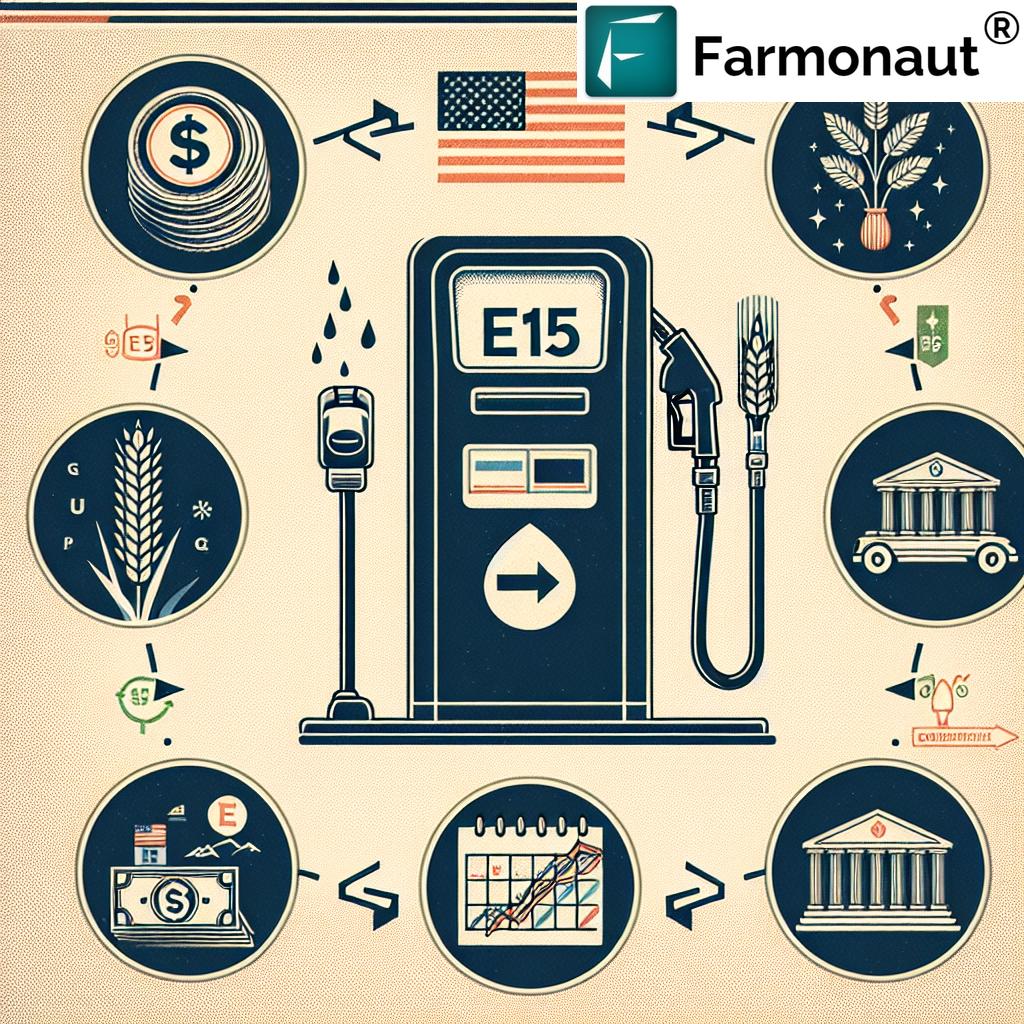Nationwide E15 Fuel Legislation: Boosting Agriculture and Lowering Pump Prices Year-Round
“The Nationwide Consumer and Fuel Retailer Choice Act could potentially impact fuel options for over 330 million U.S. consumers.”
In a groundbreaking move that could reshape America’s fuel landscape and significantly boost the agricultural sector, a bipartisan group of senators has introduced the Nationwide Consumer and Fuel Retailer Choice Act of 2025. This pivotal legislation aims to allow year-round, nationwide sale of E15 fuel, presenting a unique opportunity to lower costs at the pump while providing substantial support to our nation’s farmers and rural communities.
As we delve into the intricacies of this new bill and its potential impacts, we’ll explore how it could transform the renewable fuels market, support agriculture, and offer consumers more choices at the gas station. Let’s begin by understanding the context and significance of this legislation.
Understanding E15 Fuel and Current Legislation
Before we dive into the details of the new legislation, it’s crucial to understand what E15 fuel is and the current regulations surrounding its use.
- What is E15 fuel? E15 is a fuel blend containing 15% ethanol and 85% gasoline. It’s designed to be used in flexible fuel vehicles and most gasoline-powered vehicles manufactured since 2001.
- Current regulations: Under existing rules, E15 sales are restricted during summer months in many areas due to concerns about increased evaporative emissions in warmer weather.
- Seasonal availability: These restrictions have led to a patchwork of availability across the country, creating confusion for consumers and challenges for retailers.
The current seasonal restrictions on E15 have long been a point of contention for both the renewable fuels industry and many lawmakers. These limitations have hindered the widespread adoption of E15, despite its potential benefits for consumers and the agricultural sector.

The Nationwide Consumer and Fuel Retailer Choice Act: A Game-Changer
The introduction of the Nationwide Consumer and Fuel Retailer Choice Act of 2025 marks a significant shift in fuel legislation. This bipartisan effort, led by Senator Deb Fischer (R-NE) and co-sponsored by a diverse group of senators, including Tammy Baldwin (D-WI), Amy Klobuchar (D-MN), and Chuck Grassley (R-IA), aims to address the longstanding issues surrounding E15 fuel availability.
Key aspects of the legislation include:
- Year-round availability: The act would allow E15 to be sold nationwide throughout the year, eliminating seasonal restrictions.
- Consumer choice: By making E15 more widely available, the legislation aims to provide consumers with additional fuel options.
- Support for agriculture: Increased demand for ethanol could significantly benefit corn farmers and rural communities.
- Potential price reductions: Year-round availability of E15 could lead to lower fuel costs for consumers.
This legislation represents a culmination of years of advocacy from various stakeholders, including agricultural groups, fuel retailers, and environmental organizations. It’s a testament to the growing recognition of biofuels’ role in addressing both economic and environmental concerns.
Impact on Agriculture and Rural Communities
“Year-round E15 sales could boost demand for corn by up to 2 billion bushels annually, supporting thousands of American farmers.”
One of the most significant potential impacts of the Nationwide Consumer and Fuel Retailer Choice Act is its effect on the agricultural sector, particularly corn farmers and rural communities. Here’s how this legislation could boost agriculture:
- Increased corn demand: Year-round E15 sales could substantially increase the demand for corn, the primary feedstock for ethanol production in the United States.
- Stabilized markets: A consistent, year-round demand for ethanol could help stabilize corn prices, providing farmers with more predictable income.
- Rural economic development: Increased ethanol production could lead to job creation and economic growth in rural areas where many ethanol plants are located.
- Diversified markets: Expanding the ethanol market provides farmers with an additional outlet for their crops, reducing reliance on traditional food and feed markets.
The potential agricultural benefits of this legislation align well with the mission of companies like Farmonaut, which aims to support farmers through innovative technology solutions. While Farmonaut focuses on precision agriculture and crop monitoring, the increased demand for corn could provide additional opportunities for farmers to leverage such technologies to optimize their yields and profitability.
Consumer Benefits and Pump Prices
A key aspect of the Nationwide Consumer and Fuel Retailer Choice Act is its potential to benefit consumers directly. Here’s how year-round E15 availability could impact fuel prices and consumer choice:
- Lower pump prices: E15 is often priced lower than conventional gasoline, potentially leading to savings for consumers.
- Increased competition: More fuel options could lead to increased competition among retailers, potentially driving down prices further.
- Consistent availability: Year-round sales would eliminate confusion about when E15 is available, making it easier for consumers to choose this option consistently.
- Reduced dependence on foreign oil: Increased use of domestically produced ethanol could reduce reliance on imported oil, potentially stabilizing fuel prices in the long term.
While the exact impact on pump prices may vary depending on factors such as oil prices and local market conditions, the increased availability of E15 is generally expected to provide consumers with more affordable fuel options.
Environmental Considerations
The environmental impact of increased E15 use is a complex topic that has been the subject of much debate. Here are some key points to consider:
- Reduced greenhouse gas emissions: Some studies suggest that ethanol blends can reduce greenhouse gas emissions compared to pure gasoline.
- Air quality concerns: Critics have raised concerns about potential increases in certain types of emissions during summer months.
- Land use implications: Increased corn production for ethanol could have impacts on land use and biodiversity.
- Water usage: Ethanol production requires significant water resources, which could be a concern in water-stressed regions.
It’s important to note that the environmental impacts of increased E15 use are still being studied, and the overall effect will likely depend on various factors, including production methods and land management practices.

Industry Support and Endorsements
The Nationwide Consumer and Fuel Retailer Choice Act has garnered significant support from various industry associations, including:
- American Petroleum Institute
- Renewable Fuels Association
- Growth Energy
- National Corn Growers Association
- National Farmers Union
- National Association of Convenience Stores
This broad support from diverse industry groups underscores the potential wide-ranging impacts of the legislation and the recognition of its importance across various sectors.
Comparison: Current vs. Proposed E15 Fuel Legislation
| Aspect | Current Legislation | Proposed Legislation | Potential Benefits |
|---|---|---|---|
| Year-round availability | Restricted during summer months in many areas | Available year-round nationwide | Consistent consumer access, simplified retail operations |
| Summer sales | Generally prohibited | Allowed | Increased fuel options during peak driving season |
| Estimated pump price difference | Varies seasonally | Potentially $0.05 – $0.10 lower per gallon | Consumer savings, increased competitiveness |
| Agricultural support | Limited by seasonal restrictions | Increased demand for corn year-round | Stabilized markets, potential for up to 2 billion bushels additional demand |
| Environmental impact | Mixed, with concerns about summer emissions | Potential for reduced greenhouse gas emissions | Possible contribution to climate change mitigation |
| Consumer choice | Limited by seasonal availability | Consistent year-round options | Greater flexibility for consumers, potential for market-driven innovations |
This comparison highlights the significant changes proposed by the new legislation and the potential benefits across various aspects of the fuel market and agricultural sector.
Implications for the Renewable Fuels Industry
The passage of the Nationwide Consumer and Fuel Retailer Choice Act could have far-reaching implications for the renewable fuels industry:
- Increased production capacity: Year-round demand could lead to investments in new ethanol production facilities or expansions of existing ones.
- Innovation incentives: A stable market for ethanol could encourage research and development into more efficient production methods and new biofuel technologies.
- Infrastructure development: Fuel retailers may invest in more E15-compatible equipment, expanding the availability of the fuel.
- Market growth: The consistent availability of E15 could lead to increased consumer adoption and market share for ethanol blends.
These changes could significantly reshape the renewable fuels landscape, potentially leading to a more robust and competitive industry.
Challenges and Potential Obstacles
While the Nationwide Consumer and Fuel Retailer Choice Act has garnered significant support, it may face several challenges:
- Regulatory hurdles: The Environmental Protection Agency (EPA) may need to revise existing regulations to accommodate year-round E15 sales.
- Infrastructure limitations: Some fuel stations may require upgrades to their equipment to handle E15, which could be costly.
- Consumer education: There may be a need for widespread education efforts to inform consumers about E15 and its compatibility with their vehicles.
- Opposition from certain groups: Some environmental groups and organizations representing other industries may oppose the legislation.
Addressing these challenges will be crucial for the successful implementation of the act if it passes.
The Role of Technology in Supporting Agricultural Growth
As we consider the potential impact of increased ethanol production on agriculture, it’s worth noting the role that technology can play in supporting farmers to meet this growing demand. Companies like Farmonaut are at the forefront of this technological revolution in agriculture.
Farmonaut’s satellite-based crop health monitoring and AI-driven advisory systems can help farmers optimize their corn yields, which could be crucial in meeting the increased demand for ethanol feedstock. By providing real-time insights into crop health, soil moisture levels, and other critical metrics, Farmonaut’s technology enables farmers to make data-driven decisions that can improve productivity and efficiency.
To learn more about how Farmonaut’s technology can support agricultural growth, visit their web application or explore their API for developers.
Looking Ahead: The Future of Renewable Fuels
The Nationwide Consumer and Fuel Retailer Choice Act represents a significant step forward for the renewable fuels industry, but it’s just one part of a broader conversation about the future of energy in the United States. As we look ahead, several key trends and considerations emerge:
- Advanced biofuels: Research into next-generation biofuels, including those made from non-food crops or waste materials, continues to advance.
- Electric vehicles: The growing electric vehicle market may impact long-term demand for liquid fuels, including ethanol blends.
- Carbon reduction goals: Increasing focus on reducing carbon emissions may drive further innovation in the renewable fuels sector.
- Agricultural practices: Sustainable farming methods and precision agriculture technologies will play a crucial role in meeting increased corn demand while minimizing environmental impacts.
As these trends unfold, the renewable fuels industry will likely continue to evolve, potentially opening up new opportunities for farmers, fuel retailers, and consumers alike.
FAQ Section
Q: What is E15 fuel?
A: E15 is a fuel blend containing 15% ethanol and 85% gasoline, designed for use in flexible fuel vehicles and most gasoline-powered vehicles manufactured since 2001.
Q: How will the Nationwide Consumer and Fuel Retailer Choice Act affect fuel prices?
A: The act could potentially lead to lower fuel prices at the pump, as E15 is often priced lower than conventional gasoline. However, the exact impact will depend on various factors, including oil prices and local market conditions.
Q: Is E15 safe for my car?
A: E15 is approved for use in all flexible fuel vehicles and most gasoline-powered vehicles manufactured since 2001. However, it’s always best to check your vehicle’s owner’s manual or consult with the manufacturer to confirm compatibility.
Q: How will this legislation impact farmers?
A: The act could significantly benefit farmers, particularly corn growers, by increasing demand for ethanol. This could lead to more stable corn prices and potentially boost rural economies.
Q: What are the environmental implications of increased E15 use?
A: The environmental impact of E15 is a complex issue. While some studies suggest it can reduce greenhouse gas emissions compared to pure gasoline, there are also concerns about potential increases in certain types of emissions and land use implications.
Conclusion
The Nationwide Consumer and Fuel Retailer Choice Act of 2025 represents a significant milestone in the evolution of America’s fuel market and agricultural policy. By potentially allowing year-round sales of E15 fuel nationwide, this legislation could reshape the renewable fuels landscape, provide new opportunities for farmers, and offer consumers more choices at the pump.
As we’ve explored, the act has far-reaching implications for various sectors, from agriculture and rural communities to fuel retailers and consumers. While challenges remain, the broad support from diverse industry groups underscores the potential benefits of this legislation.
As this story continues to develop, it will be crucial to monitor its progress and potential impacts. Whether you’re a farmer looking to capitalize on increased corn demand, a consumer interested in fuel options, or simply someone concerned about energy policy, the Nationwide Consumer and Fuel Retailer Choice Act is certainly a development worth following.
For those in the agricultural sector, leveraging technology like Farmonaut’s satellite-based crop monitoring could be key to meeting the potential increased demand for corn efficiently and sustainably. As we move towards a future with potentially greater reliance on renewable fuels, the intersection of policy, technology, and agriculture will undoubtedly play a crucial role in shaping our energy landscape.
Stay informed, stay engaged, and be part of the conversation as we navigate this exciting new chapter in renewable fuels and agricultural policy.
Explore Farmonaut’s Solutions
As we consider the potential impacts of increased ethanol production on agriculture, it’s clear that farmers will need advanced tools to optimize their crop yields and manage their resources efficiently. Farmonaut offers cutting-edge solutions that can help farmers meet these challenges:
- Satellite-Based Crop Monitoring: Get real-time insights into your crop health and soil moisture levels.
- AI-Driven Advisory: Receive personalized recommendations for optimal crop management.
- Resource Management Tools: Efficiently manage your farm’s resources to maximize productivity.
To explore how Farmonaut can support your farming operations, check out our platforms:
Farmonaut Subscriptions
Earn With Farmonaut
Earn 20% recurring commission with Farmonaut’s affiliate program by sharing your promo code and helping farmers save 10%. Onboard 10 Elite farmers monthly to earn a minimum of $148,000 annually—start now and grow your income!
For more information about our affiliate program, visit Earn With Farmonaut.
By leveraging Farmonaut’s advanced agricultural solutions, farmers can position themselves to take full advantage of the opportunities presented by the potential increase in ethanol demand, while also promoting sustainable and efficient farming practices.
















